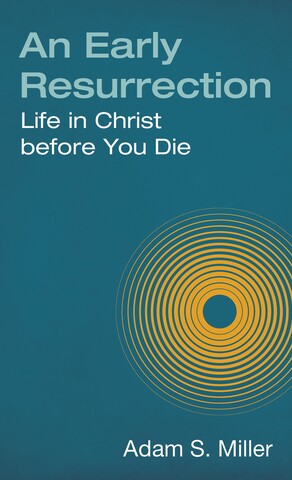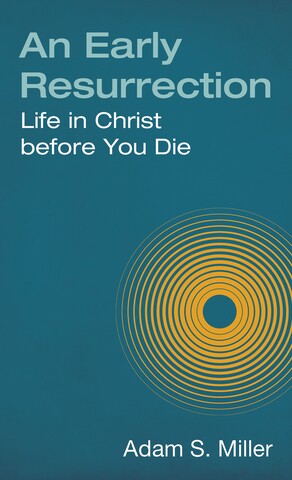To say that the law can only be fulfilled by Christ is to say that the law can only be fulfilled by love. Love is the point of the law. “All the law and the prophets” hang on this imperative to love (Matthew 22:40). Without love, the law comes unplugged from Christ. It stops functioning as a type and leaves me hopeless. When, instead of love, the law generates fear, anger, guilt, envy, and frustration, then the law is broken. A loveless law is a broken law. A loveless law is a law incapable of mercy or justice. A loveless law is an occasion for selfishness, pride, and hypocrisy.
Love is the key to life in Christ because love is itself a certain way of handling time. Love is a certain way of looking forward, a way of looking at the world, right now, as already redeemed. Love is a way of looking at this fragile world as already beset, on a global scale, by an early resurrection.
Love Is a Form of Dying
Full of love, I die while I’m still alive. I lose my life before I’m dead, and, then, in Christ, I find it. Love works just as Christ said: “He that findeth his life shall lose it: and he that loseth his life for my sake shall find it” (Matthew 10:39). Love is hard because it’s a kind of death.
To love, I have to be willing to die. I have to be willing to let go of my life and give myself to caring for the lives of others. And, then, to continually live in love, I have to be willing to die every day, every hour, in ways that are big and small, again and again. I yield on the freeway. I bite my tongue when I want to criticize. I put down what I’m doing and read to my kids. I stay up late and finish the dishes. I get up early and drive my daughter to seminary. I grade the next paper. I put on my running shoes. I exhale. I surrender my life. Crucified with Christ, I practice surrendering all day long until my days are filled with the rest of the Lord. I practice dying as a way of life. And I keep practicing until I find the kind of rest that comes only from living my life in the form of a thousand daily deaths.
►You’ll also like: Elder Robbins: How to Built a Love That Lasts Forever
Paul is uncompromising on this point. There are many spiritual gifts. And there are many laws that promise blessings. But, without love, they’re all empty. “Though I speak with the tongues of men and of angels, and have not charity, I am become as sounding brass, or a tinkling cymbal” (1 Corinthians 13:1). And the same is true with other gifts like prophecy, knowledge, and faith: “And though I have the gift of prophecy, and understand all mysteries, and all knowledge; and though I have all faith, so that I could remove mountains, and have not charity, I am nothing” (v. 2). Even my good works, my obedience and self-sacrifice—even these are hollow without love: “And though I bestow all my goods to feed the poor, and though I give my body to be burned, and have not charity, it profiteth me nothing” (v. 3). Everything but love will fail. Everything but love, defying time in Christ, will pass away. Only “charity never faileth: but whether there be prophecies, they shall fail; whether there be tongues, they shall cease; whether there be knowledge, it shall vanish away” (v. 8).
Love Does Not Create Fear, Guilt, or Shame
The law is no different. The law is a gift. But the law, like all these other gifts, will also find an end in Christ. Love never will. Unlike love, the law is no lord or master. Take, for instance, the difference between guilt and responsibility. Apart from Christ—ungrounded in love, postponing resurrection—the law does pose as my master. Mastered by the law, I stand guilty before it. I’m judged and condemned. Guilty before the law, I’m cut off. I’m isolated in my weakness. I’m more alone, less connected, and even less able to love. Loveless, I’m nothing. But responsibility is different. Grounded in love, the law doesn’t condemn my weakness, it empowers me to be responsible for that weakness. Rooted in Christ, the law doesn’t isolate me from others, it binds me to them. It urges me to care for them. It helps me to be responsible to them. In Christ, the law holds me responsible by empowering me to respond to the hurt I’ve caused and the needs others have.
Love is a useful measure for distinguishing guilt from responsibility. Guilt is about me. It centers me on myself and weakens my power to care for myself and for other people. But responsibility faces the opposite direction. Responsibility is an act of love. It recognizes wrongdoing and repents of it. But rather than acting penitent out of fear or shame, it lets those self-centered feelings be crucified with Christ. Then, alive in Christ rather than in myself, I become capable of responding—even to my own weakness—with love.
But if I haven’t died, the law will remain my master. I’ll always feel guilty. I’ll always feel inadequate and ashamed. I’ll always be thinking about myself when I fail to meet the law’s measures, and worrying about myself will leave me feeling more alone. But if, in love, I’ve died early, then everything is different. When I inevitably fall short, I won’t feel guilty—“I” am already dead. Instead, resurrected in Christ, I’ll take responsibility. I’ll become capable of mercy and justice. I’ll take my weakness as another occasion to care for the lives that we share.
Love Liberates Us
Love’s peculiar way of looking forward is liberating. If the future has already arrived, then I can put down that burden. I can find rest. “Come unto me, all ye that labour and are heavy laden, and I will give you rest. Take my yoke upon you, and learn of me; for I am meek and lowly in heart: and ye shall find rest unto your souls. For my yoke is easy, and my burden is light” (Matthew 11:28–30). This is true, but what is my heavy burden? What weighs me down and keeps me from entering the rest of the Lord? This burden is, I think, time. This burden is the future, manifest in the present as guilt, fear, stress, lust, envy, and resentment. And the weight of that future, of a perpetually postponed redemption, is crushing. When I lie in bed and close my eyes, I can feel it. I can feel time’s weight. It squats like an anvil on my chest. I can feel the creep of a cell-deep panic at the thought of what I haven’t done, at the thought of what I haven’t become, at the thought of what I don’t have, at the thought of all that eludes me.
Notice this about time. My obsession with myself is largely an obsession with my future. I identify myself with my future. Will I be happy? Will I get the girl? Will I win the game? Will I get the job? Will I be loved and praised? Will I be saved? All of these questions are framed in the future tense. And, framed in the future tense, all of them invite worry and fear. This kind of worry and fear draws me out of the present and obscures the truth about Christ and about love. They invite me to hope in something other than Christ. They refuse to live in Christ as though he had already come. They prevent me from entering the rest of the Lord.
►You’ll also like: How We Can Live in God's Presence Before We Die
Christ offers something different. He invites me to come to him. He invites me to put down my burden. What I’m doing is no way to live. It’s no way to handle time. It’s no way to look forward. It’s lonely and worried. It’s frustrated and angry. Christ invites me to watch him and learn from him. He invites me to take up time’s yoke the way he does: by being meek and lowly in heart. Like Christ, I need to practice death as a way of life and, thus, press death into the service of life.
Love Allows Us to Be Present in Eternity
This is counterintuitive. My intuition is to post-pone death, not embrace it. My intuition is to stick to my own plan and live time chronologically, to live the present as a means of winning a future that could save me. My intuition is to love the present in light of what I hope the present will eventually become. In this way, I’m seduced into aiming right through the present—right through the people I’m with, through the work I’m doing, through the place where I stand—at the promised outcome. As a result, my way of looking forward ends up being a way of looking through. Love may look forward to things, but it doesn’t look through them. Love locks eyes with them. Love sees them, right here, right as they are, right now: ugly and beautiful, strong and weak, whole and maimed, sinner and saint. Love, primed by Spirit, cares for them as they are.
Love, rather than living time as a means to an end, lives time as an end in itself. If I’ve already died—if the end has already come—then work is not just a means to some other end. With my own end already passed, everything becomes an end in itself. Everything becomes valuable in its own right, on its own terms, in its own present weakness. In Christ, I learn to love life for its own sake. Because I’m already dead, I’m free to “give to every man that asketh” (Luke 6:30). I can let things go. I can give things away. And, especially, I’m free to treat others the way I want to be treated. I’m free to treat them as ends in themselves, not just as means to something else. “As ye would that men should do to you, do ye also to them likewise” (Luke 6:31). I can treat them as being worth my time and attention, as ends in themselves, because my own end has, in Christ, already come and gone.
I put down my burden and take up Christ’s yoke. This burden is the future. This yoke is love. But this yoke is light because yokes are, by definition, shared. No longer holding life at arm’s length, no longer aiming through this world at another, I’m also no longer alone. Not only am I yoked with Christ, I’m yoked by Christ’s love with the whole of this present world. Yoked in Christ with the world, we pull together.
Get more profound insights from Adam Miller in An Early Resurrection: Life in Christ Before You Die.
Along with Nephi, "we talk of Christ, we rejoice in Christ, we preach of Christ," (2 Nephi 25:26) but in all our talking and learning, have we learned how to live in Christ? What does a life in Christ look like—or feel like?
In this thought-provoking exploration of the writings of the Apostle Paul and Book of Mormon prophets, Adam Miller examines what life in Christ looks like. How can we let ourselves and our own desires die so we can be born again to a new life, a full life in Christ, here and now in this mortal life?
Embark with the author on this journey—at once scriptural, philosophical, and literary—and discover one way to share a life with Christ as if he were present today.




